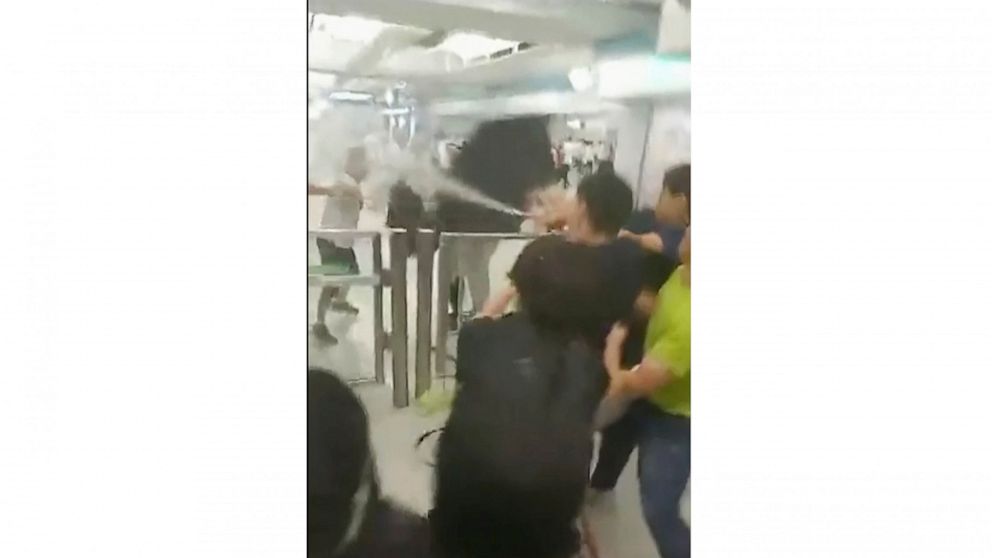[ad_1]
An overnight attack by white-clad assailants apparently targeting pro-democracy protesters raised tensions to new levels in Hong Kong on Monday as China harshly criticized the weekend demonstration, saying “central authority cannot be challenged.”
Interested in China?
Add China as an interest to stay up to date on the latest China news, video, and analysis from ABC News.
The Chinese rebuke came after its Hong Kong office was targeted Sunday night by protesters who pelted it with eggs and spray-painted its walls. It made no mention of the violent attack hours later at a subway station by men wielding iron pipes and wooden poles as they beat up people clad in the pro-democracy movement’s black shirts. Dozens were injured.
The attack on China’s Liaison Office was an escalation of the weekslong protests, during which demonstrators besieged Hong Kong’s legislature and police headquarters but did not direct their ire at China itself. It came after more than 100,000 people marched through the city to demand democracy and an investigation into the use of force by police to disperse crowds at protests.
As demonstrators made their way home, a gang of men descended on a group of them at a subway station. Video of the attack in Hong Kong’s Yuen Long neighborhood showed the protesters being beaten by the assailants as they retreated into the trains, intimidated by the gangs of men waiting for them outside the turnstiles. The attackers then entered the trains and beat the people inside as they tried to defend themselves with umbrellas.
At least 45 people were injured, and 15 remained hospitalized Monday afternoon, including one man in critical condition, the Hospital Authority said.
Subway passengers filmed by Stand News and iCABLE angrily accused police officers of not intervening to protect the demonstrators, who have been critical of the police use of force.
Hong Kong leader Carrie Lam said Monday that allegations that police had colluded with the assailants were “unfounded.”
The Sunday night assault on Beijing’s Hong Kong Liaison Office touched a raw nerve in China. China’s national emblem, which hangs on the front of the building, was splattered with black ink. It was replaced by a new one within hours.
The official People’s Daily newspaper, in a front-page commentary on Monday headlined “Central Authority Cannot Be Challenged,” called the protesters’ actions “intolerable.”
“These acts openly challenged the authority of the central government and touched the bottom line of the ‘one country, two systems’ principle,” the government’s Hong Kong and Macao Affairs Office said in a statement Sunday.
Lam repeated the same statement to reporters Monday, adding that the vandalism “hurt the nation’s feelings.”
The “one country, two systems” framework, under which the former British colony was returned to China in 1997, allows Hong Kong to maintain a fair degree of autonomy in local affairs. Demonstrators fear the pro-Beijing government in Hong Kong is chipping away at their rights and freedoms, and the weekslong tumult has fueled fears of a more aggressive Chinese response.
In Washington, President Donald Trump said he believes Chinese leader Xi Jinping has acted “very responsibly” in allowing the extended protests to play out in Hong Kong. Asked about China’s handling of the protests, he said that “China could stop them if they wanted.”
“I hope that President Xi will do the right thing. But it has been going on a long time,” Trump added, without elaborating.
Meanwhile, a group of pro-China lawmakers held a news conference appealing for a halt to the violence, saying it was a blow to Hong Kong’s reputation and was scaring away tourists and investors.
They also urged police to tighten enforcement against the protesters, whom Regina Ip, a former security secretary, called “rebels.”
“The violent attack on the Liaison Office … is a direct affront to the sovereignty of our country,” Ip said.
Asked why it took at least a half-hour for police to arrive at the suburban train station where protesters were attacked, she said the police were “overstretched.”
“The police have been under extreme pressure,” she said.
Later Monday, the office of a pro-Beijing lawmaker was surrounded and vandalized by about 100 people who believed he had shaken hands the previous day with the attackers. Protesters wrote memos and stuck them on legislator Junius Ho’s office, damaged glass panels at the entrance and destroyed a surveillance camera. No one appeared to be in the office.
Meanwhile, pro-democracy lawmaker Claudia Mo said the Sunday night subway attack showed “more than apparent” involvement from the triad, a branch of organized crime in Hong Kong.
“What happened last night doesn’t seem accidental in any way,” Mo said. “It’s all organized.”
The growing crisis in Hong Kong has fueled fears that China’s People’s Liberation Army may intervene.
A Chinese army brigade said Monday that it held an anti-terrorism exercise in southern Guangdong province. The 74th Army Group did not refer to Hong Kong in its social media statement, but military commentator and retired officer Yue Gang said that troops would be dispatched to the semi-autonomous territory if needed.
“To deface the Chinese national emblem is like acting as an enemy to 1.3 billion Chinese people,” Yue said. “They must be deterred.”
Hu Xijin, editor-in-chief of the nationalistic Global Times, warned against military intervention.
“If the People’s Liberation Army helps to stabilize the situation, Hong Kong will benefit from law and order, but the public opinion won’t buy it,” Hu wrote in a commentary published on Weibo, a popular Chinese microblogging service. The public will “accuse Beijing of undermining ‘one country, two systems,'” he said.
———
Associated Press writers Ken Moritsugu and Yanan Wang, videojournalist Wong Wai-bor and researcher Shanshan Wang in Beijing contributed to this report.
[ad_2]
Source link

